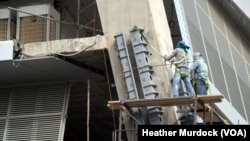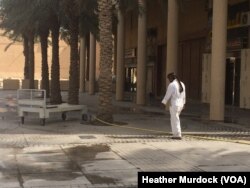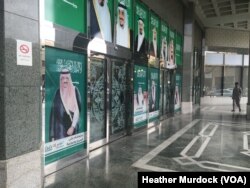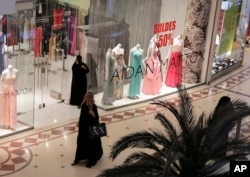At a traditional robe shop in a market in the Saudi capital, Riyadh, 28-year-old sales clerk Zachariah said he didn’t plan to come to Saudi Arabia when he fled the war in Yemen two months ago.
But with al-Qaida overrunning his neighborhood, he said he didn’t have time to apply for a visa to the United States or Sweden. He winced when asked if he missed Aden, his home city nestled among virgin beaches and rocky hills. But “where there is security, life is good,” he explained.
Security in Saudi Arabia, however, is not just about ensuring physical safety, according to analysts. With continued low oil prices and the apparent waning of the need for Saudi oil, economic security requires both reducing the nation’s dependence on oil sales and its dependence on foreign workers, according to Jamal Khashoggi, a prominent Saudi journalist.
“As long as we are not only dependent, but we are addicted to foreign labor, we cannot fix the job markets,” said Khashoggi. “The over-dependency on foreign labor doesn’t only take the jobs of the Saudis.It takes their chance to acquire skills.”
For decades, large immigrant populations have supplied Saudi Arabia with the low-cost and skilled workers it needs, while offering people a chance to escape wars, poverty or both.
But as concerns about Saudi Arabia’s future economy intensify, foreign workers say competition for jobs is harder than ever, as companies increasingly favor local hires.
Nearly 35 percent of Saudi Arabia’s work force is from outside the country, compared to about 17 percent in the United States. Workers come from India, Pakistan, Egypt, Yemen, Bangladesh, the Philippines - and the list goes on.
'Lower class' jobs
Many people in Saudi Arabia didn’t want the jobs held by foreign workers, said Khashoggi. Saudis often didn’t want to work as taxi drivers or auto mechanics or in other jobs considered "lower class," he said.
These jobs are often stigmatized, not because they didn’t require skills, he explained, but because foreign workers who took a fraction of a Saudi salary occupied them.
As a result, he said, Saudi Arabia was increasingly a country that didn’t know how to do things like fix cars.“If you had a cameraman,” he said to me as I set up a tripod and fiddle with microphones, "how long would it be before you forgot how to do that?”
The government is working to bring more Saudis into the labor force, but a fundamental shift like this will not be quick, according to Hamdan Al-Shehri, an adviser at Saudi Arabia’s foreign affairs ministry. Saudi people will not suddenly want different jobs, and foreign workers still need to work.
“Maybe with 10 or 15 years,” he said. “I’m not sure it’s going to be changed, let’s say, in five years.”
Diversifying
More than 70 percent of the Saudi economy comes from oil, according to John Sfakianakis, who has advised the Saudi government and serves as chief economist for several Saudi banks.
However, the loss of income from low oil prices, according to Sfakianakis, is an “opportunity and not really a curse,” because it compels the government to make changes, like cutting subsidies formerly considered untouchable, and expanding further into different industries, like religious tourism, minerals and transportation.
“I think that they were never pressured in these fundamental ways to think of what is Saudi Arabia’s future, after oil is less wanted by the world,” he said. “Or if oil run outs.”
But moving forward, if Saudi Arabia did diversify its economy, he added, Saudi people also would need to diversify their skill sets to make the economy more self-sufficient.
“If you go around Saudi Arabia, bakers and barbers are not Saudi,” he explained. “So imagine if bakers decided to go from Saudi Arabia? You would not have any bread.”
But foreign workers in Saudi Arabia argue they have no plans to go anywhere because the economies in many of their home countries are reeling from wars, terrorism, economic collapse and poverty.
Finding work
At a glossy shopping mall in Riyadh Monday, Fetin Ashry, an Egyptian accountant in Saudi Arabia, said it was nearly impossible to get a job keeping books at a school.
I nodded, applying stereotypes and assuming that Ashry, a fully veiled woman, was blocked by her conservative family and stymied by employers’ lack of enthusiasm for hiring females.
But that was not the issue she grappled with. “The Saudis’ priority is to give jobs to their own citizens,” she explained. “Especially now, as the economy of the world is going down.”









